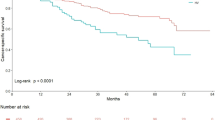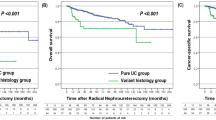Abstract
Background
No definitive evidence exists regarding the clinical significance of histologic variants (HV) in upper urinary tract cancer. We investigated the impact of HV on prognosis in patients with upper urinary tract cancer following radical surgery.
Patients and methods
We retrospectively analyzed 451 patients with upper urinary tract cancer who underwent radical nephroureterectomy at six affiliated hospitals from 1990 to 2015. Patients with distant metastatic disease prior to surgery and those who received neoadjuvant chemotherapy were excluded, leaving 441 eligible patients. Patients were classified into two groups: pure urothelial carcinoma (UC) and HV. The clinicopathological variables of each group were examined using Kaplan–Meier plots and proportional Cox hazard ratios (HR) to compare the oncological outcomes between the two groups.
Results
HV included 37 patients (8%). Compared with the pure UC patients, HV patients had significantly worse recurrence-free survival (RFS) and cancer-specific survival (CSS; RFS p = 0.0002, CSS p = 0.0001). Multivariate analysis for RFS revealed HV were independent predictors (HR 1.92; p = 0.026), but the association did not remain significant for CSS. There was no significant difference in CSS between the adjuvant chemotherapy (AC) group and the non-AC group for all HV patients, except in patients with ≥ pT3 tumor or positive lymph node status where the AC group had significantly favorable CSS.
Conclusions
HV in upper urinary tract cancer are independent predictors for RFS, but not for CSS. AC improved CSS for HV patients with ≥ pT3 tumor or positive lymph node status.


Similar content being viewed by others
References
Munoz JJ, Ellison LM (2000) Upper tract urothelial neoplasms: incidence and survival during the last 2 decades. J Urol 164(5):1523–1525
Rouprêt M, Babjuk M, Compérat et al (2018) European Association of Urology Guidelines on Upper Urinary Tract Urothelial Carcinoma: 2017 update. Eur Urol 73(1):111–122
Zigeuner R, Pummer K (2008) Urothelial carcinoma of the upper urinary tract: surgical approach and prognostic factors. Eur Urol 53(4):720–731
Waldert M, Karakiewicz PI, Raman JD et al (2010) A delay in radical nephroureterectomy can lead to upstaging. BJU Int 105(6):812–817
Zigeuner R, Shariat SF, Margulis V et al (2010) Tumour necrosis is an indicator of aggressive biology in patients with urothelial carcinoma of the upper urinary tract. Eur Urol 57(4):575–581
Sakano S, Matsuyama H, Kamiryo Y et al (2015) Impact of variant histology on disease aggressiveness and outcome after nephroureterectomy in Japanese patients with upper tract urothelial carcinoma. Int J Clin Oncol 20(2):362–368
Busby JE, Brown GA, Tamboli P et al (2006) Upper urinary tract tumors with nontransitional histology: a single-center experience. Urology 67(3):518–523
Chaudhary P, Agarwal R, Srinivasan S et al (2016) Primary adenocarcinoma of ureter: a rare histopathological variant. Urol Ann 8(3):357–359
Nadeem M, Ather MH (2014) Impact of histopathological variant on the outcome of patients treated by radical cystectomy. Korean J Urol 55(6):385–389
Klaile Y, Schlack K, Boegemann M et al (2016) Variant histology in bladder cancer: how it should change the management in non-muscle invasive and muscle invasive disease? Transl Androl Urol 5(5):692–701
Greene FL, Page DL, Fleming ID et al (2002) AJCC cancer staging manual, 6th edn. Springer, New York
Epstein JI, Amin MB, Reuter VR et al (1998) The World Health Organization/International Society of Urological Pathology consensus classification of urothelial (transitional cell) neoplasms of the urinary bladder. Bladder Consensus Conference Committee. Am J Surg Pathol 22(12):1435–1448
Matsumoto K, Hirayama T, Kobayashi K et al (2015) Laparoscopic retroperitoneal nephroureterectomy is a safe and adherent modality for obese patients with upper urinary tract urothelial carcinoma. Asian Pac J Cancer Prev 16(8):3223–3227
Ikeda M, Matsumoto K, Hirayama T et al (2018) Selected high-risk patients with upper tract urothelial carcinoma treated with radical nephroureterectomy for adjuvant chemotherapy: a multi-institutional retrospective study. Clin Genitourin Cancer 16(3):e669–e675
Shibing Y, Turun S, Qiang W et al (2015) Effect of concomitant variant histology on the prognosis of patients with upper urinary tract urothelial carcinoma after radical nephroureterectomy. Urol Oncol 33(5):204.e9–e16
Tang Q, Xiong G, Li X et al (2015) The prognostic impact of squamous and glandular differentiation for upper tract urothelial carcinoma patients after radical nephroureterectomy. World J Urol 34(6):871–877
Rink M, Robinson BD, Green DA et al (2012) Impact of histological variants on clinical outcomes of patients with upper urinary tract urothelial carcinoma. J Urol 188(2):398–404
Moschini M, Dell'Oglio P, Luciano' R et al (2017) Incidence and effect of variant histology on oncological outcomes in patients with bladder cancer treated with radical cystectomy. Urol Oncol 35(6):335–341
Kim JK, Moon KC et al (2017) Variant histology as a significant predictor of survival after radical nephroureterectomy in patients with upper urinary tract urothelial carcinoma. Urol Oncol 35(7):e9–458.e15
Leow JJ, Martin-Doyle W et al (2014) A systematic review and meta-analysis of adjuvant and neoadjuvant chemotherapy for upper tract urothelial carcinoma. Eur Urol 66(3):529–541
Necchi A, Lo Vullo S, Mariani L et al (2018) Adjuvant chemotherapy after radical nephroureterectomy does not improve survival in patients with upper tract urothelial carcinoma: a joint study by the European Association of Urology-Young Academic Urologists and the Upper Tract Urothelial Carcinoma Collaboration. BJU Int 121(2):252–259
Kwak C, Lee SE, Jeong IG, Ku JH (2006) Adjuvant systemic chemotherapy in the treatment of patients with invasive transitional cell carcinoma of the upper urinary tract. Urology 68(1):53–57
Fujita K, Taneishi K, Inamoto T et al (2017) Adjuvant chemotherapy improves survival of patients with high-risk upper urinary tract urothelial carcinoma: a propensity score-matched analysis. BMC Urol 17(1):110
Lucca I, Kassouf W, Kapoor A et al (2015) The role of adjuvant chemotherapy for lymph node-positive upper tract urothelial carcinoma following radical nephroureterectomy: a retrospective study. BJU Int 116(1):72–78
Sharma P, Callahan MK, Bono P et al (2016) Nivolumab monotherapy in recurrent metastatic urothelial carcinoma (CheckMate 032): a multicentre, open-label, two-stage, multi-arm, phase 1/2 trial. Lancet Oncol 17(11):1590–1598
Sharma P, Bono P, Kim JW et al (2016) Efficacy and safety of nivolumab monotherapy in metastatic urothelial cancer (mUC): results from the phase I/II CheckMate 032 study. J Clin Oncol 34(15):4501
Bellmunt J, de Wit R, Vaughn DJ et al (2017) Pembrolizumab as second-line therapy for advanced urothelial carcinoma. N Engl J Med 376:1015–1026
Necchi A. An open label, single-arm, phase 2 study of neoadjuvant pembrolizumab (MK-3475) before cystectomy for patients with muscle-invasive urothelial bladder cancer. https://clinicaltrials.gov/ct2/show/NCT02736266
Bristol-Myers Squibb. A phase 3 randomized, double-blind, multi-center study of adjuvant nivolumab versus placebo in subjects with high risk invasive urothelial carcinoma (CheckMate 274: CHECKpoint Pathway and nivoluMAb Clinical Trial Evaluation 274). https://clinicaltrials.gov/ct2/show/NCT02632409
Acknowledgements
This work was supported in part by a Parent’s Association (Keyaki Kai) Grant of Kitasato University School of Medicine. No additional external funding received for this study. The funders had no role in study design, data collection and analysis, decision to publish, or preparation of the manuscript.
Author information
Authors and Affiliations
Corresponding author
Ethics declarations
Conflict of interest
The authors declare that they have no competing interests to report.
Additional information
Publisher's Note
Springer Nature remains neutral with regard to jurisdictional claims in published maps and institutional affiliations.
About this article
Cite this article
Murakami, Y., Matsumoto, K., Ikeda, M. et al. Impact of histologic variants on the oncological outcomes of patients with upper urinary tract cancers treated with radical surgery: a multi-institutional retrospective study. Int J Clin Oncol 24, 1412–1418 (2019). https://doi.org/10.1007/s10147-019-01486-y
Received:
Accepted:
Published:
Issue Date:
DOI: https://doi.org/10.1007/s10147-019-01486-y




